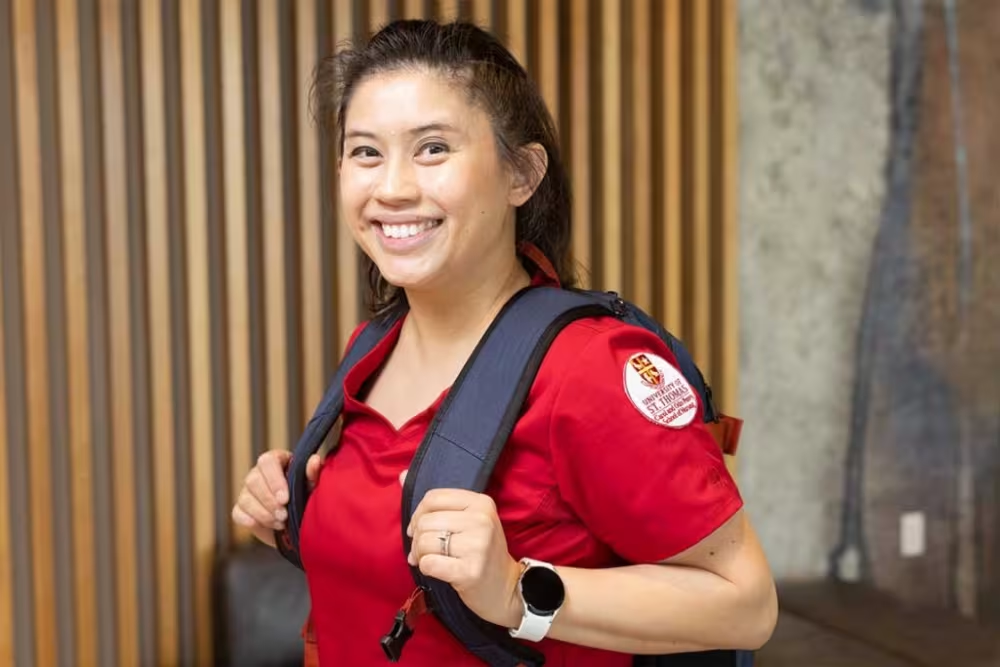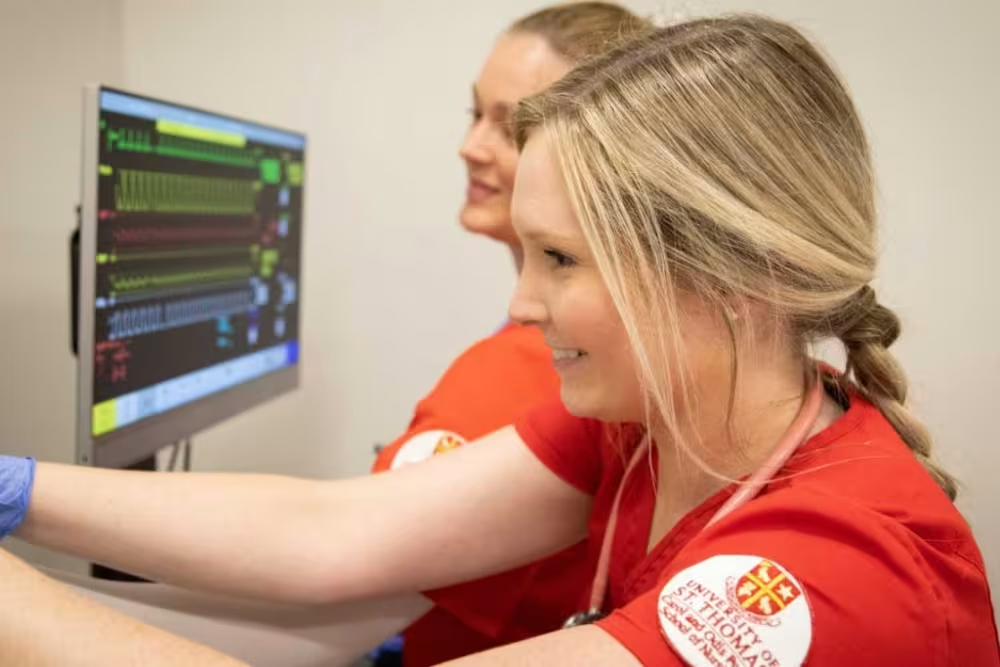Nursing Terms: Common Medical Terminology for Nurses
Each blog post is dated and contains accurate information as of that date. Certain information may have changed since the blog post publication date. If you would like to confirm the current accuracy of blog information, please visit our ABSN overview page or contact admissions at (855) 830-2713.
Author Bio: Founded in 1947, The University of St. Thomas has helped many aspiring nurses on their path toward a successful career in nursing through its Accelerated Nursing Program in Houston, Texas.
If you’re considering nursing school, you must start learning medical terminology for nursing students. Some standard nursing terms include code blue, charting, basic metabolic panel and electrocardiogram. Some helpful acronyms to learn include DNR, EHR, ABC and WNL. You’ll also want to explore different nursing degrees.

If you’ve ever watched a medical sitcom or drama, chances are you occasionally felt confused with the terminology. Indeed, nursing has its own vocabulary, and learning the different terms can be challenging for new students.
Before starting nursing school, it can be helpful to familiarize yourself with a few new terms each week to build your nursing vocabulary. Are you still feeling overwhelmed after reviewing nursing terms for a few weeks? Not to worry! If you’ve chosen to enroll in the University of St. Thomas (UST) Houston’s Accelerated Bachelor of Science in Nursing (ABSN) program, you’ll benefit from a robust curriculum and hands-on activities that provide plenty of opportunities to practice using various nursing words to reinforce your learning.

What’s the difference between the ABSN vs. BSN programs? Learn about the benefits and opportunities these two programs offer.
Types of Nursing Degrees
Before delving into medical terminology for nursing students, you should know the academic acronyms. When you first start researching nursing schools to explore the possibility of a career change to nursing, you must figure out exactly which nursing degree you need to pursue the career you want.
The most common nursing degrees are:
- ADN: An Associate Degree in Nursing requires the completion of a two-year degree program and allows graduates to sit for the National Council Licensure Examination for Registered Nurses (NCLEX-RN®).
- BSN: A Bachelor of Science in Nursing is typically a four-year undergraduate program that provides a more comprehensive curriculum than an ADN and leads to sitting for the NCLEX.
- MSN: A Master of Science in Nursing is typically a two-year graduate program that allows licensed nurses to sharpen their skills in a specialty area.
- DNP: A Doctor of Nursing Practice is a terminal degree. This doctorate is the highest level of academic achievement in the nursing field.
Types of Nurses

Different nursing degrees can lead to different career outcomes. Here’s a breakdown:
- RN: A registered nurse may have an ADN or BSN and a graduate degree.
- APRN: An advanced practice registered nurse needs a graduate nursing degree, board certification and an APRN license. There are different types of APRNs in different specialties, including:
- CNS: Clinical nurse specialist
- CNM: Certified nurse midwife
- CRNA: Certified registered nurse anesthetist
- NP: Nurse practitioner
All of these types of nurses need to know various nursing medical terminology. RNs and other nurses also work with diverse healthcare providers—from physicians and specialty doctors to CNAs and LPNs. Let’s take a closer look at these and other types of healthcare providers:
- CNA: A certified nursing assistant isn’t a nurse but can take vital signs and perform other essential tasks. CNAs help patients with activities of daily living (ADLs), such as feeding, grooming, bathing and toileting. In a hospital, CNAs support the nursing staff.
- LPN or LVN: A licensed practical or vocational nurse has completed an LPN/LVN training program and passed the relevant licensure exam. They are nurses but aren’t RNs. They can perform a limited range of nursing tasks, including wound care, catheter insertion and vital sign monitoring.
- Radiology technician: A radiology technician specializes in performing diagnostic medical imaging exams, including X-rays and CT scans.
- Surgical technician: A surgical technician prepares and sterilizes surgery rooms, equipment and instruments.
Nursing Words Involving Specialties
While all nurses need to know fundamental nursing words, some of the necessary terminology depends on the nursing specialty chosen by the nurse. The following are some typical nursing specialties you might explore in nursing school:
- Nursing informatics: Operates health information technology and performs data analysis
- Nurse anesthetist: Administers anesthesia and pain meds to patients undergoing procedures
- Oncology nurse: Cares for cancer patients
- Radiology nurse: Specializes in diagnostic imaging
- ICU nurse: Works in the intensive care unit
- Cardiac nurse: Cares for patients with cardiovascular conditions
Becoming a nurse later in life: Is it feasible? Learn more about the pros and cons of pursuing a nursing career at a more advanced age.

Basic Nursing Vocabulary
From blood pressure to code blue, there is plenty of vocabulary to learn as a nursing student. Some of the most fundamental nursing terms you should know include:
- Vital signs: Health indicators like heart rate, blood pressure, body temperature and respiratory rate
- Blood pressure: One of the vital signs nurses measure when they assess patients
- Charting: The act of updating a patient’s health record or chart
- Charge nurse: The nurse in any given hospital department who supervises other nurses during a shift
- Code blue or coding: A medical emergency, such as cardiac arrest, that requires immediate intervention
- Specimen: A bodily sample, such as blood, urine or tissue
- Respiratory rate: How many breaths a patient takes each minute
Medical Tests and Procedures

Patients can’t always be diagnosed just through a physical assessment and evaluation of their symptoms. Often, medical tests or procedures are needed. The following nursing terms relate to some common medical tests and procedures:
- CT scan: A computed tomography scan, which employs X-ray technology, produces highly detailed medical images.
- Ultrasound: A medical imaging procedure that uses sound waves.
- Urinalysis: A urine test can detect an assortment of health issues, such as urinary tract infections (UTIs).
- IV therapy: Intravenous therapy can deliver medications, rehydration fluids and other fluids into a patient’s veins.
- Basic metabolic panel: A BMP is a blood test that assesses various bodily functions, including kidney function.
- EKG: An electrocardiogram can evaluate cardiovascular abnormalities.
Helpful Nursing Acronyms
As you work through nursing school, you’ll notice that much of the medical terminology for nurses involves acronyms. Acronyms are helpful with patient charting and communicating verbally with other nurses.
You’ll want to add the following nursing acronyms to your vocabulary:
- ABC: When a patient is unresponsive, you should check the airway, breathing and circulation.
- CBR: Complete bed rest. A patient whose chart has a CBR note is not allowed out of bed for any reason.
- WNL: Within normal limit. WNL can refer to test results or activity levels within a typical range.
- DNR: Do not resuscitate. Patients might have a DNR health directive signed if they do not want to be resuscitated should they suffer a fatal event.
- EHR: Electronic health records refer to the patient’s digital health records.
- OTC: An over-the-counter medication.

There are many strategies available for students to finance their education. Check out this guide to financial aid for nursing school.
Nursing Instruments
Other crucial medical terms for nursing students involve equipment and tools and include the following:
- Catheter: A catheter usually refers to a thin, hollow tube inserted into the urethra to drain urine from the bladder. However, there are other types of catheters.
- Sharps container: This rigid container is used to safely house biomedical waste that punctures skin, such as needles.
- Pulse oximeter: This device clips onto the finger to measure the oxygen level in a patient’s blood.
- Hemostat: This tool, which looks similar to a pair of scissors, is used to clamp blood vessels to control bleeding.
Gain a Solid Nursing Foundation at UST

Nursing school may seem challenging, but we specialize in providing exceptional student support services at UST. You’ll work with a dedicated admissions counselor to navigate the application process and determine what prerequisites you must complete for eligibility. Following enrollment, you can meet with an academic success coach for additional support until you sit for the NCLEX-RN.
Our robust coursework, labs and clinical rotations are designed to equip you with the nursing knowledge and skills you need to succeed, including nursing medical terminology.
Ready to get started? Contact an admissions advisor today to see if you’re eligible to graduate with a nursing degree in as little as 12 months.
